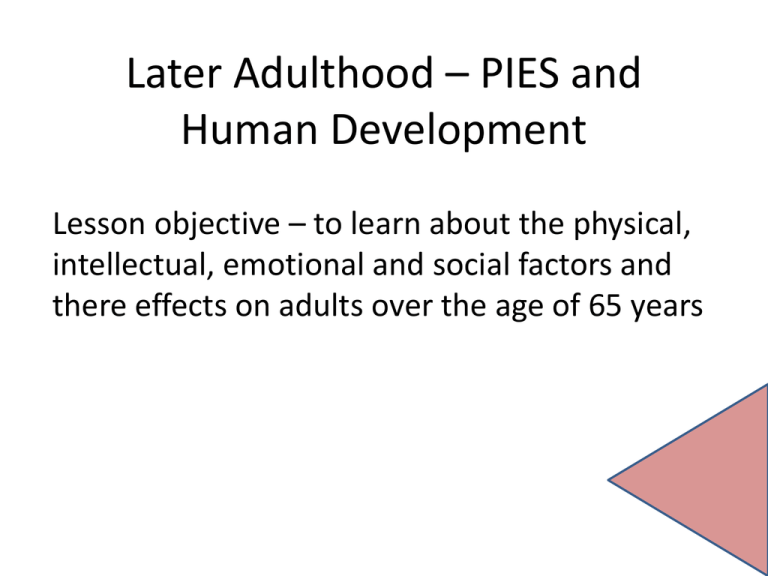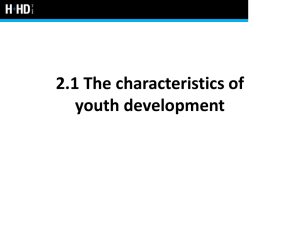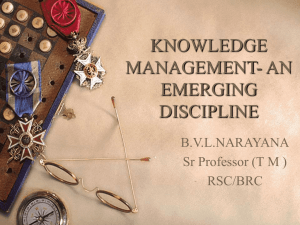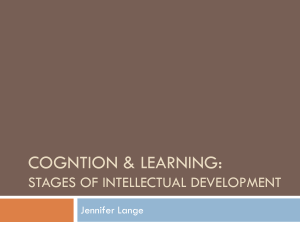
Later Adulthood – PIES and
Human Development
Lesson objective – to learn about the physical,
intellectual, emotional and social factors and
there effects on adults over the age of 65 years
Physical changes
• Starter activity - List as
many physical changes
that you have observed
in people over the age
of 65 years
• Information to help you
on page 11
•
•
•
•
•
•
•
•
•
Think about:
Colouring
Stance
Size
Skin tone
Posture
Health and well-being
How have their senses
change?
Lesson objective – to learn about the physical, intellectual, emotional and social factors and
there effects on adults over the age of 65 years
•
AfL
•
• Common age-related
physical changes
•
include hearing
impairment,
weakening vision, and •
the increasing
probability of
arthritis,
hypertension, heart
disease, diabetes, and •
osteoporosis. The
speed with which
information is
encoded, stored, and
received may
decrease as we age,
and older Americans
may experience
memory loss.
Hearing impairment among older adults is often
moderate or mild, yet it is widespread; 48 percent of
men and 37 percent of women over age 75
experience hearing difficulties.
Visual changes among aging adults include problems
with reading speed, seeing in dim light, reading small
print, and locating objects.
The amount of time it takes to respond to features in
the environment once they are detected is typically
slower among older adults.
The proportion of older adults needing assistance
with everyday activities increases with age. Nine
percent of those between ages 65 and 69 need
personal assistance, while up to 50 percent of older
Americans over 85 need assistance with everyday
activities.
The top five causes of death among older adults are
heart disease, cancer, cerebrovascular disease
(relating to the blood vessels that supply the brain),
pneumonia and flu, and chronic obstructive
pulmonary disease. In spite of a decline in physical
health, two-thirds of older adults who are not living
in institutions (such as nursing homes) report their
health to be good, very good, or excellent compared
with others their age. What's important to
remember about people over age 65 is that while
many begin to experience some physical limitations,
they learn to live with them and lead happy and
productive lives.
Later adulthood 65+
•
In their sixties and early seventies, many
adults lead varied and interesting lives.
Lon-distance travel, often to see sibling
and other relatives, and new leisure
pursuits such as painting and writing are
common. The opportunities for older
people to meet new friends can be
extensive when their health is good and
they have sufficient money. There are,
however, many older people who find it
difficult to make ends meet and tend to
withdraw from socialising, due to feelings
of shame. In addition, there are those
who suffer from ill-health and
impairments, which result in their social
isolation. A network of family and friends
can provide vital and practical support,
physically, socially and emotionally.
Key concept in later adulthood –
family is viewed as a social group
made up of people connected to
each other by blood or marriage.
Families in Britain usually consist
of adults acting as parents or
guardians to children,
grandparents are often an
extension to this.
Emotional positives and negatives
•
•
•
•
•
•
•
•
•
•
•
Dementia, the irreversible deterioration of intellectual ability accompanied by emotional disturbance, afflicts between 5 and
7 percent of adults over age 65 and 30 percent of those over age 85. Unlike milder forms of mental decline with normal
aging, dementia may lead to significant impairment in social functioning. People with dementia often suffer from
depression, anxiety, and paranoia.
Six percent of older adults suffer from anxiety disorders, and the most common anxiety diagnosis is generalized anxiety
disorder, in which a person experiences dread, apprehension, and tension for a period of at least 6 months.
The highest suicide rate of any age group is in older adults, primarily older Caucasian men who live alone.
The incidence of sexual dysfunction increases with age for both men and women.
Sleep problems increase with age, and about one-half of those over age 80 complain of sleep difficulty.
Ten to 15 percent of older adults exhibit hypochondriasis, the persistent belief that one has a medical disorder despite the
lack of medical findings.
Prevalence of alcohol abuse and substance dependence among those age 65 and over is 2 to 5 percent for men and 1
percent for women.
Drug abuse among older adults typically takes the form of prescription medication abuse, and older adults take 25 percent
of the medication taken in the United States, which underscores that drug abuse among aging adults is often a result of
having too many medications prescribed for them.
Depression is a negative emotion frequently characterized by sadness, feelings of helplessness, and a sense of loss. Those
with depression are likely to have an abrupt onset of symptoms, a history of psychiatric problems, decreased motivation,
and a tendency to complain about their memory problems. However, depression among noninstitutionalized older adults is
less prevalent than depression in younger adults.
Behavior disorders in those over age 65 can take the form of physical aggression, motor overactivity (wandering), and
disruptive verbal outbursts. Common causes of behavior disorders include delirium, depression, dementia, and psychosis.
Alzheimer's Disease is a progressive disease that leaves a victim unable to form new memories and is marked by the loss of
other mental functions. One of the primary symptoms of Alzheimer's Disease is the inability to recall newly learned
information, such as a change of address, and disorientation. The onset of Alzheimer's is often gradual, occurring over a
period of 8 to 20 years. At first, victims suffer memory loss and often get lost--even in their own homes. Eventually, they may
fail to recognize other people, including family; show childish emotions; and lose the ability to dress and clean themselves
Lesson objective – to learn about the physical, intellectual, emotional and social factors and
there effects on adults over the age of 65 years
•
In a child's case - a lot of irritating
behaviour – sibling rivalry and
bickering, for example – is the
manifestation of the lack of certain
skills: the ability to share, postpone
gratification, wait rather than
interrupt. “If you work on teaching
those skills, you don’t have to put as
much emphasis on punishment,”
Positive reinforcement is normally used
by instructors who are teaching
participants new skills. As the name
implies, positive reinforcement is
"good" and reinforces "good" (or
positive) behaviour.
Therapy and instruction in positive
reinforcement will help older people
if the instructions are continually
reinforced and should be part of the
teaching-learning process to ensure
correct behaviour.
Instructors need to use it on a frequent
and regular basis early in the process
to help the students/client retain
what they have learned. Then, they
should use reinforcement only to
maintain consistent, positive
behaviour.
•
Lesson objective – to learn about the physical, intellectual, emotional and social factors and
there effects on adults over the age of 65 years
•
Lesson objective – to learn about the physical, intellectual, emotional and social factors and
there effects on adults over the age of 65 years
Intellectual further development
• Dementia, the irreversible deterioration of intellectual ability
accompanied by emotional disturbance can affect some.
• Given this, however, the human brain is able to continually adapt
and rewire itself. Even in old age, it can grow new neurons. Severe
mental decline is usually caused by disease, whereas most agerelated losses in memory or motor skills simply result from
inactivity and a lack of mental exercise and stimulation. In other
words, use it or lose it.
• In addition, it is a myth: “Many assume that memory abilities will
decline in older adulthood to a degree that will significantly affect
day-to-day functioning.” Rather, about 85% of adults age 65 and
older do not show significant declines in memory ability and are
able to live independently.
•
Lesson objective – to learn about the physical, intellectual, emotional and social factors and
there effects on adults over the age of 65 years
•
AfL
• The speed with which
information is encoded,
stored, and received
•
may decrease as we
age, and older people
•
in the UK may
experience memory
loss.
•
•
•
Because it may take older adults more time
to encode, store, and retrieve information,
the rate at which new information is
learned can be slower among aging adults,
and older adults often have a greater need
for repetition of new information. Although
it may take older adults longer to input and
retrieve new information, daily occupational
and social functioning among those over
age 65 is not impaired.
Long-term memory shows substantial
changes with age, while short-term memory
shows less age-related decline.
Most aspects of language ability remain
strong, yet word-finding ability declines
with age. Three-dimensional drawing
similarly declines with age.
Wisdom and creativity often continue to the
very end of life.
Overall prevalence of mental disorders in
older adults is less than in any other age
group, and general life satisfaction among
older UK residence is as good as, if not
better, than any other age group.
Lesson objective – to learn about the physical, intellectual, emotional and social factors and
there effects on adults over the age of 65 years
Social positive and negative development
•
Lesson objective – to learn about the physical, intellectual, emotional and social factors and
there effects on adults over the age of 65 years
In later life people may find that
they mentally withdraw from
cognitive activities and future
develop0ment in this area.
Therefore, it is important that
treatment is given to older
people to first, understand just
how physically impaired they
are, as often older people will
feel that they are more
physically incapable than is
evident. Secondly, it is then the
job of the occupational
therapist to monitor the client’s
interests and creatively put in
place therapy and activities that
will simulate and engage the
client in a social and
reconnecting way.
Apply some knowledge - Tasks
• You are asked to read
the case studies and
plan out a range of
activities that will
reengage your client.
• Eco-integrity
• Social selectivity theory
• Activity theory
• Disengagement theory
• Continuity theory
•
• Secondly – you are
asked to analyse how
many of these theories
and concepts you have
used to help come up
with an activity plan
that results in a positive
self-concept for your
elderly client.
Lesson objective – to learn about the physical, intellectual, emotional and social factors and
there effects on adults over the age of 65 years
In later life people tend to maintain very
close relationships with family and very
close partners declines minimally
•
Lesson objective – to learn about the physical, intellectual, emotional and social factors and
there effects on adults over the age of 65 years
•
Lesson objective – to learn about the physical, intellectual, emotional and social factors and
there effects on adults over the age of 65 years
AfL
Key words and literacy - Ego-integrity - Self-concept
Independence – Dementia – Sedentary - Acceptance
Resilience - Reminiscence Multifaceted Despair
Stability – Psychological - Disengagement - activity
theory -
•
Lesson objective – to learn about the physical, intellectual, emotional and social factors and
there effects on adults over the age of 65 years
•
Lesson objective – to learn about the physical, intellectual, emotional and social factors and
there effects on adults over the age of 65 years
Deciding to retire and the reasons why
you want to retire
•
Lesson objective – to learn about the physical, intellectual, emotional and social factors and
there effects on adults over the age of 65 years
We all know that people age at different rates, according to their genes, their health
or their environment; but many people in their 60s and 70s are no more vulnerable
than the rest of the population, all of whom, after all, are pretty vulnerable: they
may be robbed, mugged, run over by a bus, choked by the field of rape the local
farmer has sown next to their house, fall victim to swine flu, whatever their age.
In fact, the very concept of vulnerability is suspect, if applied to the old as a class
defined solely by date of birth. It should be reserved for those who are manifestly at
risk, those whose bones, or grasp of reality, have become fragile, or who have
become blind, or unable to walk. These people are vulnerable in the sense that, like
children, they need to be protected from accidents, and they can no longer live
alone. These and these alone should count as old; and so when to deem yourself old
at last must be a personal decision (though I admit that many people fight so hard
against making this decision that they have already become a source of anxiety to
their children or neighbours, who may therefore seek to take the decision
vicariously).
In any case, before the decision has been taken, to assume that we all need special
protection is an insult. I believe that I am as capable as any other householder of
detecting a bogus offer from a cowboy builder, or a fraudulent telephone call
offering me the chance to win millions of pounds. That is a matter of education and
common sense, not of age. Nor does the fact of living alone itself render me
vulnerable, as people often suppose. It's often inconvenient, if I can't open a
packaged-up toothbrush, or hang a picture without destroying the whole wall. But I
have never been able to do these things, it's only that I once had someone to do
them for me, like doing the income tax returns. I'm certain that I'm not the only old
person who does not want to be pitied or patronised, but left to get on with life on
my own, until that becomes impossible. Then I'll be ready to join the ranks of the
looked-after, and treated like a child. It will be the worst thing in the world.
So what does this dread of succumbing to the designation "vulnerable" tell me about
personal identity? Am I the same as I always was? If I am honest the depressing
answer is probably: "Yes, only worse." I have always been happy by myself, and now,
with increasing deafness, I am more so. I have always been bad at putting up with
items of popular culture like easy-listening music, convenience food, television or
radio comedy (except Yes, Minister) and what the BBC calls "a light-hearted look" at
this or that. Now I can bear them even less.
It is the thought that one day I may have to live in a world where there is nothing but
these items that appals me, as much as the physical decrepitude I shall by then be
suffering. Looking after the old ought essentially to be a matter of trying to
understand what they like and hate, what they have always liked and hated, and of
trying to protect them, not against their own supposed mental frailty and
dependence, but against a life bereft of any of the pleasures they value. Our present
record falls short of this by many miles.
The nation needs to invest much more in the ability of older people to make best use
of their brains, according to anew report from a government think-tank.
Foresight, the government unit charged with thinking strategically for the future, said
it was vital to exploit the "mental capital" of mature adults. However, little money has
gone into anything other than leisure classes, with scant evidence of how useful they
are.
Addressing dementia should be a priority for government, declares Foresight's latest
report, distilled from more than 100 expert submissions. "Treating dementia costs the
UK £17bn a year – this is set to rise to £50 billion a year within 30 years," it says.
By 2071 the numbers of people aged over 80 are expected to more than treble to 9.5
million, while there could be twice as many over 65s (21 million) as now.
Action is needed now to protect their prosperity and physical and psychological health,
according to the report. An appetite for lifelong learning needs to be developed among
the very young.
Foresight, which is part of the government office for science, does not make
government policy but aims to inform it.
John Denham, secretary of state for innovation, universities and skills, who is the
report's ministerial sponsor, launched a consultation into informal adult learning in
January and will in due course publish a policy document.
Foresight's report coins the phrase 'mental capital', which refers to person's cognitive
and emotional resources, how flexible and efficient they are at learning, and their
social skills and resilience in the face of stress.
The thinktank says: "In a society where the mental capital of older people is seriously
undervalued, it is unsurprising that there has been little investment to date in
providing other than recreational classes for older students."
"The mental capital of older people is a massive and under-utilised resource. Unlocking
this could benefit the wellbeing and prosperity of older people and society as a
whole."
Continuing education is increasingly important, Foresight says. For one thing, work is
changing rapidly. People will need to be more flexible and prepared to re-train.
"The 'use it or lose it' principle in which an individual's mental capital is nurtured in
order to protect against cognitive decline will also be important," the thinktank notes.
But at present, despite increasing interest in the principle of lifelong learning the great
majority of people entering older age will have had little education since school many
decades earlier.
Training in information technology could be one highly effective means of promoting
self-education among older adults as well as bringing them new opportunities for
business or voluntary work.
The links between education and training and economic reward are clear
though complex, comments the report, which draws on an extensive
two-year study involving more than 400 international experts in subjects
ranging from neuroscience to economics.
Other wider benefits are not so easily measured but are nonetheless of
important social value. Many of these are about preventing such
negative outcomes as social exclusion, community breakdown and
mental health problems.
Evidence from a number of countries shows that education is strongly
linked to people's health and their behaviour to safeguard their health. It
can cause more people to take preventative care, which increases health
care costs in the short term but may lead to long-run saving.
Education appears to protect against depression. Young men and women
with at least one O-level were reckoned to reduce their risk of adult
depression by 6 percentage points. But its impact on general happiness
or wellbeing has been less well substantiated.
Welcoming the report, Denham said: "Future prosperity and social
justice in the UK will be strengthened by drawing on the mental capital
and talents of its citizens and I am pleased this report recognises that the
government is already on the right track in many areas.
"A range of departments and organisations across government and more
widely are committed to taking forward the project's findings and I look
forward to overseeing the progress of that over the coming year."
Conclusion to PIES
• Armed with the facts about the myths and realities
surrounding aging, society can better prepare itself to
assist its older population, as can individual families.
Regular mood and memory checkups should be
encouraged for all older adults, just as we now
encourage regular physicals. What's important to
remember is that depression and social isolation are
not normal for older UK residence -living happily and
productively is the norm for today's older adults.
Continuity theory, continued engagement and activity
theory all help us understand more the value and
important role that the over 65’s play in our society.
•
Lesson objective – to learn about the physical, intellectual, emotional and social factors and
there effects on adults over the age of 65 years
A truly enduring love: Britain's longest-married couple (77
years) tell their enchanting story with photos from their album
•
Last week it was revealed that Ralph and Phyllis Tarrant are
the longest-married couple in Britain. In an age where few
marriages endure, their 77 years together are inspiring.
•
So what 's their secret for a long-lasting union? Here, LAURA
TOPHAM tells the story of Ralph, 107, and
Phyllis,101,through their own enchanting words and
pictures.
1925 WE'RE JUST GOOD FRIENDS
Phyllis was 16 when she met Ralph, a 22-year-old
steelworker. For years they were simply friends in a group of
youngsters who congregated on a Sheffield street corner
each evening to go walking or cycling.
'There was no thought of sex in those days,' says Ralph.
Romance developed when they bumped into one another
alone one evening. Ralph says: 'We started talking, then
realised we'd been walking for hours -Phyllis had to fly to get
home by 10pm.'
•
•
•
•
•
•
•
•
Phyllis is less sure: 'I have no idea,' she
says, 'but it's certainly a great
achievement.' Ralph credits their longevity
to being healthy and active and having lots
of cheese and onion sandwiches.
•
Their 74-year-old son, also called Frank,
said the main secret of his parents'
wedded bliss was simply being happy with
each other.
"They've enjoyed themselves, enjoyed
their lives very much but they've been
always very content with their lot," he
said.
•
•
•
Says Dorie: 'Folk don't put up with things these days. The
least little problem and they're up and off, aren't they'?
•
http://www.focusonthefamily.com/
2010 STILL SO DEVOTED
So, 85 years after the couple met, what is
their secret to such a long and happy
marriage? 'I always enjoy myself as much
as I can,' says Ralph, 'Whatever the object
or opposition. I like life and I've always
looked after myself.'
http://www.dailymail.co.uk/femail/article-1297273/A-trulyenduring-love-Britains-longest-married-couple-77-years-tellenchanting-story-photos-album.html
Secure your knowledge - Examination style questions – please answer in
full
•
Lesson objective – to learn about the physical, intellectual, emotional and social factors and
there effects on adults over the age of 65 years
Examination style questions – please answer in full
Examination style questions – please answer in full







